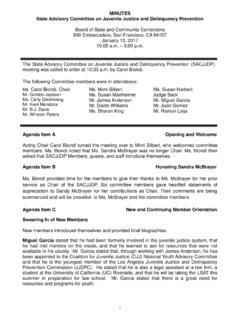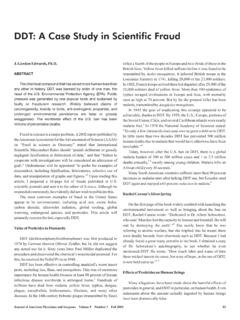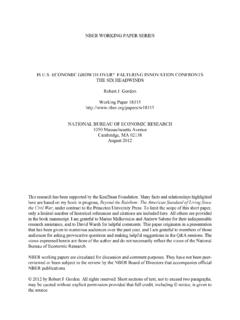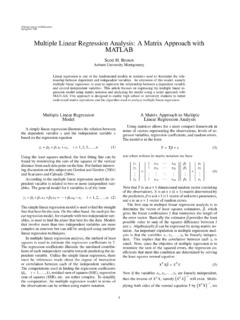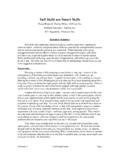Transcription of Personality Robert Hogan, Gordon J. Curphy, and Joyce Hogan
1 1 American Psychologist--June 1994 This article may not exactly replicate the final version published in the APA journal. It is not the copy of record. American Psychological Association Accepted for publication in American Psychologist (June 1994) What We Know About Leadership: Effectiveness and Personality Robert Hogan , Gordon J. Curphy, and Joyce Hogan Although psychologists know a great deal about leadership, persons who make decisions about real leaders seem largely to ignore their accumulated wisdom. In an effort to make past research more accessible, interpretable, and relevant to decision makers, this article defines leadership and then answers nine questions that routinely come up when practical decisions are made about leadership ( , whom to appoint, how to evaluate them, when to terminate them). According to the political scientists, the fundamental question in human affairs is Who shall rule?
2 As psychologists who are less infused with the spirit of realpolitik we believe the question is Who should rule? The question must be answered during national elections, when CEOs are replaced, and when university presidents retire. The question concerns how to evaluate leadership potential. When it is answered incorrectly, teams lose, armies are defeated, economies dwindle, and nations fail. In terms of the number of printed pages devoted to the subject, leadership appears to be one of the most important issues in applied psychology. Volumes appear on the topic every year, and a recent review lists over 7,000 books, articles, or presentations (Bass, 1990). However, the rules of psychological research are such that we tend to focus on narrowly defined issues. The result is that our research is primarily read by other psychologists. Although J.
3 P. Campbell (1977) and Mintzberg (1982) recommended that researchers pay more attention to applications, what we know seems to have little impact on the people who actually make decisions about leadership. The gap between what we know and what leadership decision makers want to know may explain the popularity of such books as In Search of Excellence (Peters & Waterman, 1982), The Change Masters (Kanter, 1983), Leaders: The Strategies for Taking Charge (Bennis & Nanus, 1985), and The New Leaders (A. M. Morrison, 1992). These books are not intended to be scientific dissertations; rather, they offer practical suggestions about how to identify and evaluate leadership. To reduce the gap between TITLE AUTHOR(s) 2 American Psychologist--June 1994 researchers and the lay public, this article answers nine questions that psychologists are often asked by persons who must choose or evaluate leaders.
4 3 American Psychologist--June 1994 What Is Leadership? Various writers have argued that our evolutionary history makes us both selfish (Dawkins, 1976) and yet able to identify with the welfare of our social unit perhaps because individual survival sometimes depends on group survival (Eibl-Eibesfeld, 1989; J. Hogan , 1978). It is important to distinguish between a person s short-term and long-term self-interest; actions that promote the group also serve an individual s long-term welfare. History mournfully suggests, however, that without an external threat to their group, people largely pursue their short- term interests. This article provides a context for understanding leadership. In our view, leadership involves persuading other people to set aside for a period of time their individual concerns and to pursue a common goal that is important for the responsibilities and welfare of a group.
5 This definition is morally neutral. A Somali warlord who is trying to bring together a group of clansmen to control food supplies needs the same skills as an inner-city Chicago minister who is trying to bring together a group of parishioners to help the homeless. Leadership is persuasion, not domination; persons who can require others to do their bidding because of their power are not leaders. Leadership only occurs when others willingly adopt, for a period of time, the goals of a group as their own. Thus, leadership concerns building cohesive and goal-oriented teams; there is a causal and definitional link between leadership and team performance. What is it that leaders do? Beginning with the Ohio State studies in the 1940s and 1950s, several taxonomies of leadership behaviors have been proposed, including those by Borman and Brush (1993), Davis, Skube, Hellervik, Gebelein, and Sheard (1992), and Yukl, Wall, and Lepsinger (1990).
6 They differ primarily in terms of their specificity. Yukl et al. s list is the broadest; it identifies 14 categories of leader behavior, including planning and organizing, problem solving, clarifying, informing, monitoring, motivating, consulting, recognizing, supporting, managing conflict and team building, networking, delegating, developing and mentoring, and rewarding. Although these actions are required by persons ranging from first-line supervisors to CEOs, their relative importance differs by organizational level. These taxonomies tell us what people in leadership positions typically do, and the various commercially available, multirater assessment instruments ( , Personnel Decisions, Inc., 1991) tell us about the degree to which a particular 4 American Psychologist--June 1994 leader does these things. However, there is little published research concerning what effective leaders actually do.
7 Effectiveness concerns judgments about a leader s impact on an organization s bottom line ( , the profitability of a business unit, the quality of services rendered, market share gained, or the win loss record of a team). Indices of effectiveness are often hard to specify and frequently affected by factors beyond a leader s control. Nevertheless, effectiveness is the standard by which leaders should be judged; focusing on typical behaviors and ignoring effectiveness is an overarching problem in leadership research. Does Leadership Matter? In 1910, the Norwegians and the English engaged in a dramatic and highly publicized race to the South Pole. It was an epic contest, and the contrast between the performance of the Norwegian team led by Roald Amundsen and the English team led by Robert Falcon Scott provided a real-life study in leadership and team performance.
8 Scott s incompetence cost him the race, his life, and the lives of three team members, although, as often happens when high-level leadership fails, the details were covered up for years (cf. Dixon, 1976). The fact that Lincoln s army was inert until Ulysses S. Grant assumed command and that some coaches can move from team to team transforming losers into winners is, for most people, evidence that leadership matters. Psychologists, as researchers, are (properly) more skeptical; they often explain differences in effectiveness in terms of the factors in the environment in which a team operates. Perhaps because effectiveness is influenced by so many factors, there are only a handful of studies evaluating the impact of leadership on an organization s bottom line. Some of the best evidence we have concerns the performance of flight crews (Chidester, Helmreich, Gregorich, & Geis, 1991), military units (Curphy, 1991, 1993), U.
9 S. presidents (House, Spangler, & Woycke, 1991), and Methodist ministers (Smith, Carson, & Alexander, 1984). These studies show that certain leader characteristics are associated with enhanced team performance when the appropriate indices of effectiveness are studied. There is a second and less direct way of answering the question Does leadership matter? At the historical level one might reflect on the horrific consequences of the leadership of Adolph Hitler in Germany from 1933 to 1945 and Joseph Stalin in Russia from 1927 to 1953. Millions of people suffered and died as a consequence of the megalomaniacal visions of these two flawed geniuses, and the baleful consequences of their rule persist even today. 5 American Psychologist--June 1994 A third way to decide whether leadership matters is to ask the consumers of leadership ( , a manager s direct reports).
10 Several patterns of leadership behavior are associated with subordinates performance and satisfaction (cf. Bass, 1990; Hughes, Ginnett, & Curphy, 1993; Yukl, 1989). Conversely, reactions to inept leadership include turnover, insubordination, industrial sabotage, and malingering. R. Hogan , Raskin, and Fazzini (1990) noted that organizational climate studies from the mid-1950s to the present routinely show that 60% to 75% of the employees in any organization no matter when or where the survey was completed and no matter what occupational group was involved report that the worst or most stressful aspect of their job is their immediate supervisor. Good leaders may put pressure on their people, but abusive and incompetent management create billions of dollars of lost productivity each year. Dixon s (1976) book, The Psychology of Military Incompetence, provides a graphic and almost unbearably painful account of the consequences of bad leadership in the military.
